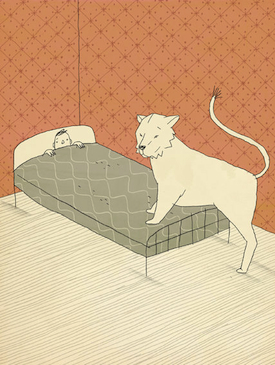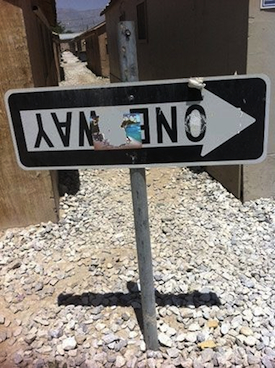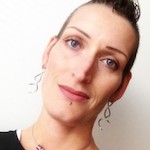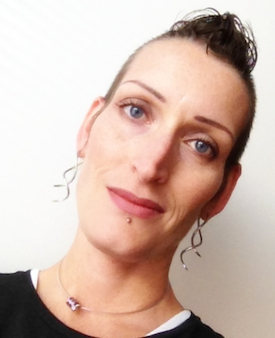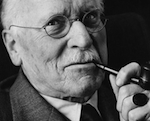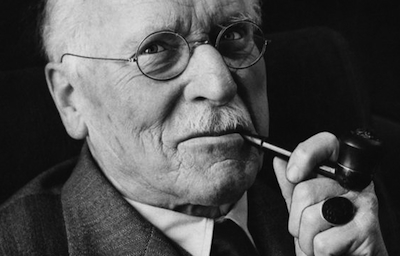Editor’s Note: This week’s sex-and-relationships guest-writer Aggie Sez at SoloPoly.com. Given that we’re at the midpoint of Mercury’s retrograde in Aquarius, the sign of groups, this piece about how to communicate clearly a “bottom line” in relationships seems a good fit. (And whether you’re poly or not, the question of relationship hierarchies is worth considering.) — Amanda P.
What I require and expect in my solo poly relationships
By Aggie Sez
The best — and sometimes hardest — part about choosing solo polyamory is that I can never coast in my intimate relationships. When you’re this far off the standard relationship escalator, you can’t afford to make assumptions about how relationships work, or about partners or metamours.
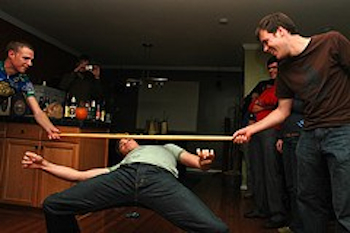
“NOTE: My intimate partners should not handle relationships like this,” says Aggie.
Through much trial and error, I’ve tried my best to develop good relationship skills — including good communication skills. I don’t claim to be perfect, or even great, as a partner or metamour. But I do try to be forthright and transparent.
In that spirit, since I can’t take anything for granted in my relationships (and since I flunked telepathy) I’m using my words right now. This post is intended to let people who might be considering getting intimately connected to me, in any sense, know up front what my bottom line is in intimate relationships.
I’m posting this to my blog because I think it’s helpful for anyone to know, and be able to articulate, their own needs and expectations, for any kind of relationship — regardless of style. I’m not saying your bottom line should match mine. But I am saying: If you don’t have your own clear bottom line, you’re asking for trouble.
I’ve found it’s absolutely essential to know what your own bottom line is. To be clear and confident about it, and not waver or cave under pressure. To not settle for, or rationalize, getting less than what you need. To not cave to pressure, manipulation or abuse. To be as flexible as you can, but to know where bending or changing would be unhealthy or destructive. And ultimately, to be willing and able to walk away from relationships which fall irretrievably below your bottom line — even if that means not having any partners, or enduring some loss.
Knowing and sticking to your bottom line is especially crucial for solo poly people. So far, most people don’t really understand solo polyamory. Having relationships with us often involves a big learning curve for people. Often they harbor conscious or unconscious assumptions or biases rooted in the escalator approach to relationships.
Consequently our partners and metamours may expect that solo poly folks will eventually end up playing by escalator rules to some extent. Or they assume we are (or should be) willing to subordinate our feelings, needs, priorities, desires or autonomy to a hierarchy. Or, conversely, that relationships aren’t really important to us — so it doesn’t really matter much if we’re not treated so well by partners or metamours.
Aggie’s bottom line in intimate relationships:
1. Honest and open relationships only. I only participate in intimate relationships which are both fully honest (that is, all major partners and metamours know about each other, and the nature/extent of those connections) and sexually and romantically nonexclusive. I don’t help people cheat, and I don’t do don’t-ask-don’t tell relationships.
I will not avoid mentioning or acknowledging any of my partners to shield other people from their own insecurities. However, I may be willing, with direct negotiation, to support partners and metamours in expanding their comfort zone — as long as this isn’t being used as an excuse to cling to insecurity or prevent change.
Honest and open applies to my life, too. I am out as poly in every context. I won’t step back into the closet, which means I’m not a good match for people who’d want or need me to lie about or conceal any of my relationships, or that I’m poly.
2. Metamour relationships. Everyone in a relationship network affects each other, directly and indirectly. I like to know who I’m affecting, and who might affect me, so we can all take each other into consideration and more realistically grasp the context of overlapping realtionships.
Therefore, I usually want to meet — or at least communicate directly with — my significant metamours before a relationship progresses too far. (“Trust, and verify.”) We don’t need to be friends, or close, or even interact much all. But it’s important to me to establish direct communication and mutual goodwill; or to figure out how to adapt if that’s not feasible.
3. I don’t do hierarchy. I don’t wish to have an escalator-style “primary” or “nesting” relationship — but I am never a “secondary” partner (or person), in any sense. I expect full respect and consideration as a human being.
Hierarchy basically means that, at least in some situations (if not all), certain partners/relationships in a network always trump others by default. This undermines everyone’s autonomy — even that of people in a primary-style relationship. Worse, hierarchy actively disadvantages nonprimary partners in their own relationships. Hierarchy is fundamentally competitive, not collaborative. It reflects a scarcity mindset and a willingness to discount some people’s investment in their own relationships. That totally doesn’t jibe with my own ethics.
This is why, I require a full and equal voice with my partners regarding the form that our own relationship takes, and in how we negotiate and collaborate to handle our connection. In addition to negotiating our boundaries and voluntary commitments, this also includes negotiating what we do/don’t wish to keep each other in the loop about concerning our other relationships, major life decisions, etc.
My partners and I probably will to take our other partners or priorities into consideration (in terms or what we are each willing or able to offer in our relationship). However, metamours do not get to make any decisions or demands concerning any relationship that I am part of. I don’t enter or remain in relationships where I’m expected to comply with rules that I did not consent to or negotiate on, or where a veto in any sense (explicit or implicit) may exist.
Rather than deferring to hierarchy, I offer negotiation and collaboration. I am able and willing to negotiate directly with partners and metamours where our boundaries, priorities or requests are concerned. I’m really good at finding solutions. I’ve found this tends to yield better results that make everyone happier (even though no one always gets everything they want), compared to some partners/relationships always trumping others by default.
4. I don’t ask for permission, but I do offer consideration. My partners do not get to make decisions or demands/rules for any relationship of mine which they are not part of. Nor do I expect, or want, them to ask my permission for how they conduct their relationships.
I expect my partners to respect and not interfere with any other relationships and partners I may have. I offer this in return. If they have concerns, questions, jealousy/insecurity, etc. concerning my other relationships, they may raise this with me calmly and respectfully — and I will listen to and consider what they have to say.
I do generally prefer to keep my partners in the loop about what’s going on in my life (including my love/sex life). I often invite or welcome my partners’ (and sometimes, my metamours’) perspectives. I’m generally open to hearing or discussing their concerns or questions. And I prefer, but don’t demand, the same consideration in return.
5. No defaults or assumed obligations. My partners and I are not entitled to each other’s time, attention, affection, sex, etc. We are not each other’s “default” anything. Our relationship does not oblige us in any ways aside from mutual honesty, respect and consideration.
If either of us wants or needs something in our relationship, I expect that we’ll ask for it, using our words. “No,” or a counteroffer, is always an acceptable response — although this should be delivered kindly or considerately, knowing that sometimes it can be scary or risky to speak up for what you really need.
6. Safer sex. I thoroughly enjoy safer sex! I also have high standards for communicating about STI risks, and I talk with partners clearly about sexual health, likes, and dislikes, right up front. (That’s fun!) This is actually a bit of a skills test: I’ve found that people who are accomplished at, and enthusiastic about, discussing and doing a variety of safer sex techniques tend to be vastly better lovers and partners.
When starting any sexual relationship, I choose to only engage in barriered penetrative sex. I will consider and negotiate other risk factors situationally. I get regular STI testing and am willing to share results upon request, as well as discuss aspects of my sex life that may have a bearing on the health of people in my network. (More about my personal approach to safer sex.)
After time (as we establish trust and if I feel confident about our risk tolerances, boundaries, STI status and testing, etc.) I may sometimes choose to forego barriers. However, unbarriered sex is neither a guarantee nor a goal for me. It may work in some relationships and not others.
If I do decide to have unbarriered sex with a partner, they or I may choose to resume using barriers at any time, for any reason. This should not be seen as having any effect on our relationship — it’s not a “demotion,” etc. People who aren’t OK with this, or who “tokenize” unbarried sex as a symbol of relationship rank or quality, are not compatible with me in a sexual relationship.
7. Constructive communication. I expect to communicate calmly, directly, clearly, constructively and as promptly as possible with partners (and, if necessary, metamours) regarding key questions, concerns, boundaries or issues involving our relationship or relationship network. It’s OK, and healthy, to express strong feelings; but it’s not OK for us to interact in a blaming, accusatory, condescending, entitled, manipulative or abusive way.
I expect and invite my partners and metamours to speak up to me directly as well, with similar civility and consideration, as needed. Use your words: I do not abide manipulative or passive-aggressive behavior.
Things change, and I expect my partners to tell me when things that might affect our relationship shift, so we can negotiate and adapt as needed. I expect us to listen to each other, especially when that’s hard, and to collaborate on finding options and solutions.
I do not remain in relationships with partners who can’t or won’t communicate calmly and constructively with me. Also, I limit contact with metamours who lack this skill or willingness. (Although I’m happy to interact constructively and amiably with metamours to the extent we both desire.)
8. We are not going to shack up, no matter how long our relationship lasts. I am not interested in sharing a home or finances with any partner, or identifying strongly as a couple rather than an individual. With some of my intimate partners, we may end up sharing very deep investment or commitment in other ways, or spending lots of time together — each relationship I’m in finds its own level over time.
This is not a distancing tactic. I absolutely need my alone time, and my autonomy. I am a better partner (and make better decisions in relationships) when my housing, finances, support network, identity, and circle of family/friends is not dependent on any intimate relationship; and when my partners are not enmeshed with me in those ways.
9. I expect cooperation and goodwill, not perfection. Everyone makes mistakes. Also, people and life (and thus relationships) are always changing. so it’s inevitable that sometimes we’ll hurt, offend, transgress, misunderstand, embarrass, or neglect each other — perhaps even badly. That’s just part of being in real relationships with real people. I prefer to discuss mistakes and transgressions calmly and learn from them, to heal and become better people through that process.
I strive to always expect, and assume mutual goodwill with my partners and metamours; that we will not intentionally try to hurt or undermine each other. I don’t abide scorekeeping, territoriality, retribution or “pulling rank.” I will not remain in relationships where resentment, competition or contempt become entrenched in our dynamic.
10. We are always free to leave or change our relationship. My strong preference is to discuss and negotiate, sooner rather than later, the possibility of ending or significantly transitioning my intimate relationships. Also, I strongly prefer to transition into viable (not in-name-only) friendship with former partners and metamours. However, I don’t require friendship — or indeed, any contact at all — post-relationship.
We don’t necessarily need to agree when a relationship is no longer worth keeping. I don’t do “zombie relationships,” where we continue on out of habit or inertia, rather than from desire and caring. I won’t stay in a relationship only because my partner isn’t ready for it to transition or end. But I will always try to end or transition relationships kindly and considerately, where possible.
11. Joy. We must continue to bring joy to each other. Maybe not every single day; there are always hard times and lulls in any relationship. Maybe not screaming-in-ecstasy joy all the time. But even a quiet smile, a shared joke, a co-created accomplishment, that’s all joy. Without joy, what’s the point? That’s what makes my world — including my relationships, and this list — “go to eleven.”
…OK, that’s my bottom line. Other people probably have different considerations.
What’s your bottom line, and how well do you communicate it?
Planet Waves last featured Aggis Sez in June 2014 with the piece, “5 Ways To Get Enough Touch, Without All the Pressure.”




